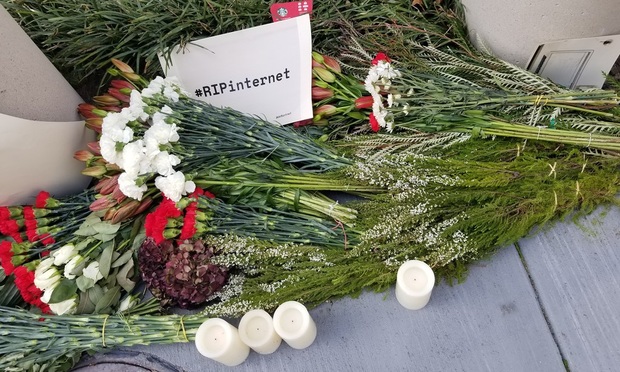 Net neutrality rally at FCC on Thursday, Dec. 14. Credit: C. Ryan Barber
Net neutrality rally at FCC on Thursday, Dec. 14. Credit: C. Ryan Barber
Democratic state attorneys general and advocacy groups Thursday said they were gearing up to fight the Federal Communications Commission over its move to scrap the Obama-era net neutrality rules that were adopted to ensure equal access to the web.
As protestors outside the FCC pronounced the death of an open internet, the FCC, led by Ajit Pai, a former Verizon lawyer, voted on party lines Thursday to repeal so-called net neutrality rules.
The 3-2 vote scraps an earlier framework, finalized in 2015, that regulated high-speed internet as a utility and prevented broadband companies from blocking website or charging for higher-quality service. It was the latest, and most devastating, setback from the FCC’s push to require those broadband providers to treat internet traffic equally regardless of its source.
Last year, a federal appeals court in Washington upheld the FCC’s efforts to promote internet openness and prevent internet broadband providers from favoring certain content and services, after twice previously sending the agency back to the drawing board.
Now, here come the lawsuits.
Washington Attorney General Bob Ferguson, moments after the repeal vote succeeded, announced his intent to sue the FCC. Any petition to review the order would likely go first into the D.C. Circuit.
“We are 5-0 against the Trump administration because they often fail to follow the law when taking executive action,” Ferguson said in a statement. “There is a strong legal argument that with this action, the federal government violated the Administrative Procedure Act—again.”
Ferguson said he planned to file a petition for review in the coming days.
Leading up to Thursday’s action, 18 state attorneys general had asked the FCC to delay the vote, citing their concerns over a flood of fraudulent public comments filed over the agency’s proposal to reverse net neutrality rules.
New York Attorney General Eric Schneiderman has raised questions about the veracity of the FCC’s comment process. His office said researchers and reporters this year discovered “enormous numbers of fake comments” were flooding in about the possible repeal of net neutrality rules.
“The FCC’s vote to rip apart net neutrality is a blow to New York consumers, and to everyone who cares about a free and open internet,” Schneiderman said in a statement Thursday. “The FCC just gave Big Telecom an early Christmas present, by giving internet service providers yet another way to put corporate profits over consumers.”
Commissioner Michael O’Rielly, a Republican member of the FCC, on Thursday downplayed the effect of the fake comments on the agency’s process.
“Some would like ot have us believe that the comment process has been irreparably tainted by the large number of fake comments. That view reflects a lack of understanding of the Administrative Procedure Act,” he said. “The agency is required to consider and respond to all significant comments in the record–millions of comments that simply say something along the lines of, ‘Keep net neutrality,’ or other colorful language we can’t say in public, including a couple that referred to me as a potato.”
Outside the FCC’s headquarters on Thursday, protesters laid out flowers and candles. One sign, nestled among bouquets of flowers, read, “#RIPinternet.”
 Net neutrality rally at FCC. Credit: C. Ryan Barber
Net neutrality rally at FCC. Credit: C. Ryan Barber
Tensions ran high in the months leading up to the vote. Last month, Pai disclosed that he had been threatened personally, with some public comments taking aim at his Indian ethnicity and signs placed near his home saying, “They will come to know the truth. Dad murdered democracy in cold blood.” On Thursday, the FCC’s meeting was briefly interrupted when security personnel cleared out the room to investigate a bomb threat.
Pai, an Obama-appointee whom the Trump administration elevated to the chairmanship early this year, on Thursday rejected the notion that the vote would spell the end of a free and open internet.
“So let’s be absolutely clear,” he said. “Following today’s vote, Americans will still be able to access the websites they want to visit. They will still be able to enjoy the services they want to enjoy. There will still be cops on the beat guarding a free and open Internet. This is the way things were prior to 2015, and this is the way they will be once again.”
Pai also took on some of his Silicon Valley adversaries, namely Twitter, a company he has criticized for blocking certain content but also allowing certain posts to be promoted. As Recode reported last month, Pai noted that Twitter had once prevented a Republican congresswoman from promoting a tweet about abortion, only to later change its mind after drawing a public backlash.
On Thursday, Pai said, “Some giant Silicon Valley platforms favor imposing heavy-handed regulations on other parts of the Internet ecosystem. But all too often, they don’t practice what they preach. Edge providers regularly block content that they don’t like. They regularly decide what news, search results, and products you see—and perhaps more importantly, what you don’t. And many thrive on the business model of charging to place content in front of eyeballs. What else is ‘Accelerated Mobile Pages’ or promoted tweets but prioritization?”
Read more:
What Major Companies Told the FCC in the Run-Up to Repealing ‘Net Neutrality’


